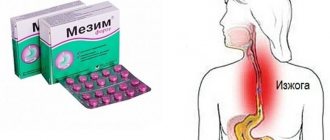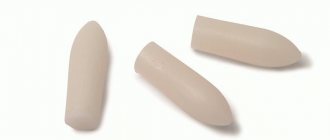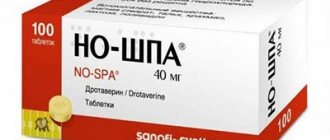The use of Diclofenac for hemorrhoids helps relieve pain and inflammation, but it is never prescribed as the main treatment. Most often, it is used for no more than 1-2 days during a period of severe exacerbation in the form of suppositories, and additionally tablets and, less often, injections may be recommended.
A preliminary examination by a proctologist is necessary, since bleeding and anal fissures can provoke a worsening of the condition. In patients with hemorrhoidal disease, long-term administration of suppositories is contraindicated due to the risk of bleeding.
Ointment with Diclofenac is applied only for external hemorrhoids to reduce swelling and inflammation; the gel cannot be used due to its alcohol base. There are restrictions for prescribing all forms of medication: pregnancy, lactation, tendency to bleeding, intolerance to aspirin, suppository components, kidney disease, liver disease, high blood pressure.
Is it always possible to use candles and other forms?
Diclofenac can be used for hemorrhoids in suppositories and other forms (tablets, ointments, ampoules) with caution and only as prescribed by a doctor. It is a fairly strong painkiller, but the drug has a number of restrictions on its use; it is contraindicated for:
- intolerance to diclofenac or auxiliary components;
- hypersensitivity to Aspirin or other non-steroidal anti-inflammatory drugs (Ibuprofen, Indomethacin) in the form of an attack of suffocation, nasal congestion, rashes like urticaria;
- inflammation of the rectum (proctitis);
- peptic ulcer of the stomach, duodenum;
- nonspecific ulcerative colitis;
- pregnancy in the 3rd trimester, and in earlier stages it is used strictly according to indications.
There are a number of diseases and conditions for which Diclofenac can be recommended, but only in a situation where:
- it is impossible to replace it with less dangerous means;
- its dose is not more than 100 mg per day;
- course of treatment – up to 3 days;
- A full examination was carried out before the appointment.
Caution is required when:
- diseases of the stomach and intestines without exacerbation;
- bleeding from the digestive system;
- perforation of an ulcer in the past;
- over 65 years of age;
- identifying the bacterium Helicobacter pylori, which is involved in the development of gastritis and peptic ulcers;
- disruption of the intestines, liver, kidneys;
- bronchial asthma;
- allergic rhinitis;
- nasal polyps;
- chronic obstructive bronchitis (bronchial spasm);
- heart diseases - angina pectoris, weakness of myocardial contraction after myocarditis, heart attack;
- damage to the blood vessels of the brain, legs;
- elevated blood cholesterol levels;
- diabetes mellitus;
- high blood pressure;
- blood loss, dehydration;
- violation of the coagulation system;
- risk of thrombosis, myocardial infarction or stroke;
- low body weight;
- simultaneous use of hormones or anticoagulants (slow blood clotting), antiplatelet agents (inhibit platelet union), antidepressants, diuretics;
- smoking or drinking alcohol.
It is important to consider that even without exacerbation of hemorrhoids (without pain, swelling and inflammation), this remedy can cause a worsening of the condition, as it causes irritation of the rectal mucosa, its thinning, and provokes bleeding. Therefore, when treating patients with articular pathology (arthritis, arthrosis, osteochondrosis) and hemorrhoidal disease, this form of release is not prescribed.
Can it be used during pregnancy?
In the 1st and 2nd trimester of pregnancy, Diclofenac is approved for use only for health reasons. Since in case of hemorrhoids it can be replaced with safe products of natural composition, the prescription is carried out extremely rarely. Self-medication is strictly prohibited. Suppositories act not only locally, but also penetrate into the bloodstream, and the active substance can cause in the fetus:
- violation of heart formation (developmental defects);
- insufficient fusion of the anterior abdominal wall with prolapse of intestinal loops;
- closure of the ductus arteriosus prematurely;
- increased pressure in the pulmonary artery system;
- low ability of the kidneys to excrete urine, dropsy.
There are cases of premature termination of pregnancy, as well as weakness of labor, bleeding after childbirth during treatment with Diclofenac. In the third trimester, the drug is contraindicated. When breastfeeding, you should also not use the drug, as it passes into breast milk.
It is important for women who are planning a pregnancy to know that if they are having problems conceiving or are being treated for infertility, this drug may adversely affect fertilization. Therefore, it is advisable to consult a proctologist about replacing it.
Precautions during treatment
In order to avoid consequences when treating with Diclofenac, you must:
- For hemorrhoids, use the minimum dose (50 mg), and the total should not exceed 100 mg per day;
- the course of treatment should be as short as possible;
- You should not use suppositories and tablets or injections at the same time; if there is still a need for a combination, then the total amount should not exceed 150 mg;
- take into account that the drug does not have a therapeutic effect on hemorrhoids, but only relieves its symptoms (pain, swelling, inflammation);
- long-term use provokes bleeding;
- the risks of side effects are higher in older patients;
- If unusual symptoms appear (abdominal pain, worsening breathing, swelling, rashes), stop using Diclofenac.
Diclofenac relieves pain and inflammation from hemorrhoids, but the drug will not cure the disease itself
Possible side effects
In most cases, the side effects of administering suppositories for hemorrhoids are limited to:
- burning sensation;
- irritation of the skin and mucous membranes around the anus;
- pain during bowel movements;
- secretion of mucus mixed with blood.
If you exceed the dosage and course of treatment with Diclofenac, complications are likely to occur:
- fluid retention, swelling;
- increased blood pressure;
- worsening condition in heart failure - increased shortness of breath, increased heart rate, swelling, pain in the liver area;
- in patients with heart disease, the risk of myocardial infarction and stroke increases, so it is necessary to immediately call a doctor if there are signs of chest pain, weakness, or speech impairment;
- bleeding from hemorrhoids or gastrointestinal;
- asthma attacks or chronic bronchitis;
- decrease in the number of blood cells - platelets, erythrocytes, leukocytes;
- allergic reactions, up to anaphylactic shock;
- mental disorders – anxiety, insomnia, irritability;
- headache, dizziness;
- general malaise;
- hearing and vision impairment;
- nausea, vomiting, diarrhea;
- exacerbation of colitis;
- deterioration of kidney and liver function;
- skin rashes - blisters, nodules, spots, as well as itching and detachment of the epithelium;
- sexual weakness.
Contraindications
Diclofenac is not used for the following conditions:
- individual intolerance to the components of the product, as well as other NSAIDs or salicylates,
- violation of the integrity of the skin at the treatment site,
- last trimester of pregnancy,
- breastfeeding period,
- children under 6 years of age.
Requires careful use for such lesions:
- exacerbation of hepatic porphyria,
- erosive and ulcerative diseases of the gastrointestinal tract,
- severe liver or kidney dysfunction,
- chronic heart failure,
- bronchial asthma,
- first and second trimesters of pregnancy,
- elderly age,
- bleeding disorders - for 5% gel.
How effective is the drug?
Diclofenac has the ability to inhibit the inflammatory process and the formation of substances involved in the occurrence of pain and the conduction of pain impulses to the brain. An important feature is its predominant effect on the musculoskeletal system (accumulates in the joint cavity). Therefore, the indications for use include mainly arthritis and arthrosis.
For hemorrhoids, it is included in the treatment plan only as an auxiliary component to relieve pain. Since the inflammatory reaction is suppressed, tissue swelling also decreases.
The drug does not have any effect on the tone of the venous walls, the progression of hemorrhoids, or stopping bleeding (on the contrary, it can increase it). Adverse effects are also observed with anal fissure - there is a feeling of severe burning, itching, irritation of the skin and mucous membranes.
Indications
The drug is prescribed to relieve unpleasant symptoms of hemorrhoids:
- pain;
- itching;
- burning.
Other indications for the use of Diclofenac:
- pathologies of the spine complicated by pain (sciatica, lumbago, radiculitis, myalgia, neuralgia, arthralgia);
- degenerative and inflammatory lesions of the musculoskeletal system: rheumatoid and gouty arthritis, bursitis, osteoarthritis and so on;
- rheumatic pathologies of extra-articular soft tissues;
- postoperative and post-traumatic pain syndromes accompanied by inflammation (for example, in proctology, dentistry);
- migraine attacks;
- algodismenorrhea;
- inflammatory phenomena in the pelvis, including adnexitis;
- infectious and inflammatory diseases of the ENT organs with severe pain: tonsillitis, pharyngitis, otitis media.
Attention! Diclofenac is indicated for symptomatic treatment, reducing inflammation and pain at the time of use, and does not affect the progression of pathology.
Diclofenac suppositories for hemorrhoids: dosage and instructions
The instructions for Diclofenac suppositories do not indicate the dosage for hemorrhoids, so an individual regimen is selected for each patient, but most often 1 suppository of 50 mg is administered at night. To do this, it is released from the packaging and immediately placed in the rectum. If possible, it is recommended to cleanse the intestines beforehand.
If necessary, the dose can be increased to 100 mg per day, then either 1 suppository of this dosage is used, or suppositories of 50 mg are used twice with an interval of 6-8 hours. If the pain is severe, then for 1-2 days the drug is additionally injected intramuscularly or a tablet is taken. In this case, the total dose of Diclofenac should not exceed 150 mg. As soon as the pain subsides, the drug is immediately discontinued.
Watch this video about how to use Diclofenac suppositories/tablets, the mechanism of action and side effects of the drug:
How else to use Diclofenac for hemorrhoids
Diclofenac for hemorrhoids is also used in the form of an ointment - it is applied around the anus in the external form of the disease in a thin layer 1-2 times a day. Tablets of 50 mg are taken no more than 3 times per day, and injections are recommended for a single administration for acute pain.
Ointment
Diclofenac ointment is prescribed for uncomplicated external hemorrhoids, that is, when there is no bleeding and signs of strangulation of the node or thrombosis. You cannot use the drug on your own. A proctologist may recommend applying it to the anal area in an amount of no more than a pea 1-2 times a day for 1-3 days. If burning or itching, irritation of the skin and mucous membranes occurs, the ointment is contraindicated.
Pills
Diclofenac tablets are used as an anesthetic for moderate pain intensity. They do not have a therapeutic effect and are needed only to alleviate general well-being. Various dosage forms are used - 25, 50 and 100 mg, the total daily dose should not exceed 150 mg. In this case, all types of the drug are taken into account, that is, after introducing a suppository or applying an ointment, you can take a maximum of another 100 mg.
In the absence of previous diseases of the stomach or intestines, the tablets are taken on an empty stomach and washed down with 100 ml of clean drinking water. If you have ever had problems with the digestive system, you should take the drug 15 minutes after eating. A course lasting no more than 3 days is allowed.
Injections
Diclofenac injections for hemorrhoids are prescribed only for acute pain. For most patients, relief can be achieved with 1 injection per day. It is much less common to inject 2 times, then it is important to take into account that the interval between injections should be from 2 to 4 hours and it is necessary to change the injection site. If 1 ampoule is used, then a candle can be placed at night to relieve pain.
Analogues of Diclofenac for the treatment of hemorrhoids
There is a drug called Proctosan (suppositories and ointment), which includes an analogue of Diclofenac - bufexamak, it belongs to the same group of non-steroidal anti-inflammatory drugs, but is much safer for injection into the rectum for hemorrhoids. The medication also contains astringent components (bismuth and titanium salts) and local anesthetic lidocaine. Proctosan is intended for the treatment of hemorrhoidal disease stages 1 and 2, rectal fissures, eczema around the anus.
Direct analogues in composition for Diclofenac are Voltaren and Diclovit suppositories.
We recommend reading about when Diclofenac suppositories are prescribed for prostatitis. From the article you will learn about the principle of action of the drug Diclofenac for prostatitis, when the effect will occur, instructions for using suppositories, possible side effects, what can be replaced. And here is more information about the benefits of using the drug Diclofenac retard.
Diclofenac suppositories are used for hemorrhoids to relieve pain in a short course. The drug helps reduce swelling and inflammation, but is considered a symptomatic remedy. It is prescribed only by a proctologist after examination.
Side effects
When using Diclofenac ointment or gel, negative skin effects are possible:
- redness;
- itching;
- peeling;
- swelling;
- eczema;
- papules and vesicles;
- photosensitivity.
With long-term use or treatment of large areas, systemic side effects of diclofenac are possible:
- headache, weakness, decreased blood pressure;
- shortness of breath, bronchospasm;
- nausea, vomiting, abdominal pain.











